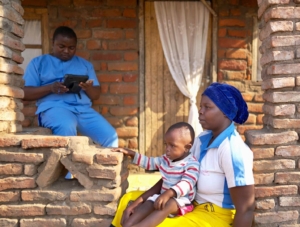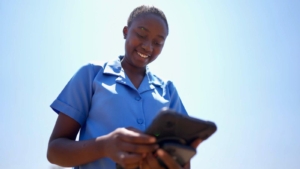It’s a busy day for Beatrice Banda. As a community health worker in Malawi, she loves providing care to members of the community–but this important work is slowed down by the extensive paperwork she has to complete for every patient. “Collecting comprehensive information on a paper-based system is cumbersome,” she admits. “There is so much information to be collected while ensuring that we are providing the clients with the best care in a timely manner.”
Using paper forms, Beatrice collects the same demographic information about the client at every visit. At the end of the month, she spends about ten hours aggregating patient information and compiling reports.
Paper-based forms cause other challenges, too. Her reports often don’t reach decision-makers, and they don’t give a comprehensive picture of the challenges at the community level. Sometimes, she says, it’s difficult to follow up on previous decisions because the papers get lost. It’s the same thing over and over again.
“The goal of community health is to ensure health equity.”
In Malawi, there is significant national momentum to improve access to and quality of healthcare at the community level. But the country’s community health workers–a cohort of approximately 11,000–are still using paper-based data collection tools, which leads to challenges for data reporting and aggregation. Health leaders and health workers often make decisions about managing and improving community-based health service delivery with incomplete data, leading to gaps in service delivery and quality. Furthermore, community health workers do not have a guide to help them make decisions at the point of care. These limitations make it hard for community health workers to do their jobs effectively and efficiently, which has real implications for the health of their patients. In rural areas, these challenges are particularly acute.
“83% of Malawi’s population lives in rural areas,” explains Dr. Kidest Lulu, Last Mile Health’s Malawi Program Director. “We should always be concerned about the health status of this majority and focused on how to provide them with the services they deserve. The goal of community health is to ensure health equity.”
As part of the Government of Malawi’s efforts to extend primary healthcare to all, Last Mile Health is contributing to the development and deployment of the country’s integrated Community Health Information System (iCHIS). This digital system supports informed decision making and action taken by community health workers at the point of care. It enables users to record basic data–such as patient data, population health, and resource availability–track cases, and take action to address individual program needs. When fully implemented, the system will reduce or eliminate the data gaps, misplaced reports, and incomplete information that have hampered Malawi’s community health system. It will provide real-time data about demand for health services and contribute to improved access to medicine and shorter wait times for immunizations.
For community health workers like Beatrice, iCHIS will make collecting and reporting data more efficient, enabling them to spend more time delivering care and building relationships with their patients. And for health leaders and policymakers, it will offer a more complete picture of the health challenges communities face, informing solutions for lasting change. It will complement the existing health management information system; shift the focus to the community level; and promote equity, empowerment, and efficiency in healthcare delivery.
“We will continue promoting and strengthening the use of digital health.”
Improving and digitizing community health information systems is essential for addressing the health challenges faced by rural communities in Malawi. Dr. Lazarus McCarthy Chakwera, President of the Republic of Malawi, underscored this in his 2021 State of the Nation Address: “At community level, we will continue promoting and strengthening the use of digital health through an integrated Community Health Information System that promises to transform community health care delivery and harmonize all community health data.”
If implemented across the country, iCHIS has the power to address many of the challenges caused or exacerbated by poor access to healthcare services, including limited health workers, out-of-reach reach health facilities, and high disease burden.
“The digital system promises the ability to closely monitor our work.”
In 2022, Last Mile Health has continued to partner with the Ministry of Health and the University of Malawi’s computer science department in the development of three key iCHIS modules, developed training manuals and digital literacy content, and conducted a training of trainers for 21 district facilitators. Together, we have provided iCHIS training to frontline health workers in three districts–Balaka, Machinga, and Salima–where 644 iCHIS-trained health workers currently serve a population of approximately 644,000.
“The digital system promises the ability to closely monitor our work, quickly notify our supervisor and district teams of the problems identified and monitor and track what is happening in real time,” says a senior community health worker from Balaka who completed iCHIS training at Chiyendausiku Health Centre. “This is something that has been a big challenge in the past.”
“A community health system that is responsive to the country’s needs.”
As of October 2022, 90% of the 644 training participants have successfully migrated to the live version of iCHIS. Looking ahead, Last Mile Health and the Ministry will begin training and roll-out of iCHIS in more districts, ultimately migrating Malawi’s entire community health workforce to the system. This means patient records and supply needs reported by frontline health workers like Beatrice and her supervisor won’t get lost due to misplaced paperwork–and disease outbreaks they report can be tracked at the community, district, and national level.
“Last Mile Health aims to strengthen Malawi’s health system by equipping community health workers with the systems they need to do their work successfully, using data systems to enable decision-making at the point of care through iCHIS as well as ensuring that appropriate policies and strategies are in place,” says Dalitso Baloyi, Last Mile Health’s Malawi Country Director. “Overall, this work should culminate in a community health system that is responsive to the country’s needs.”







